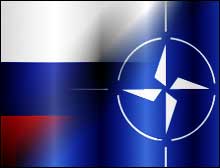
Where is NATO in 2014? The debate continues on just why, more than 20 years after the communist threat it was created to defend against has disappeared, NATO continues to nudge its way into smaller conflicts and end up making them bigger ones. RPI academic advisor, Mark Almond, debates the past and future of NATO in this fascinating short Voice of Russia radio broadcast. Sadly this is the kind of intelligent debate that you will not see among the blow-dried talking heads in the US media.
Highlights include the point made by host Peter Lavelle that the current crisis over Ukraine has proven a perfect opportunity for opportunists like Poland’s foreign minister Radek Sikorski to demand NATO boots on their own soil. Also newer NATO members that may feel threatened by the presence of Russian minorities on their soil — for example, the Baltics — may well use this crisis opportunity to demand of NATO, “We joined, you are now supposed to protect us. Now cough up some money and put some bases on our soil. The soldiers based here will help our economy as well.”
Prof. Almond points out that among average Russians, who felt the pain of West-backed early economic “reforms” that decimated their standard of living while enriching the well-connected oligarchs, there is a kind of anti-West sentiment that did not exist even in the Cold War period.
Almond also makes the interesting point that at one time NATO (and EU) membership had the effect of bringing countries once at odds together — France and Germany, UK and Germany, for example — with the post-Cold War NATO expansion the opposite has occurred. For example, the new Baltic members bring into the alliance their enmity toward Russia. Now with NATO, Almond points out, these countries have rich and powerful allies in the West that they hope to use against the old enemy. So, rather than feel happy and secure inside NATO and the EU, they seek to manipulate these organizations to serve nationalistic purposes. This, Almond explains, is very different from the intended purposes for which these alliances were developed.
Listen to the whole discussion program here.
